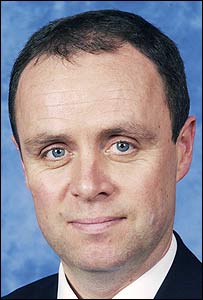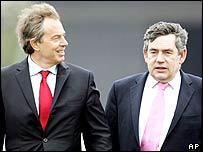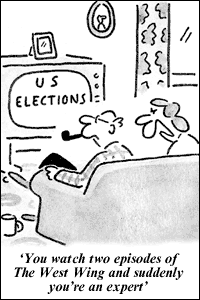 George Best and Mike England - White Hart Lane - 1973
George Best and Mike England - White Hart Lane - 1973Yesterday was the first anniversary of George Best's death. It's rather strange, because his final departure really set me off writing this collection of Bits and Pieces. As it says in the piece below, I am very much NOT a footy man, but for reasons I simply don't understand George Best had found a place in my heart. His death moved me to write down my thoughts, and the piece I wrote set me off on the Blog trail. I only showed it last year to a couple of friends at work, and then left it. But, given the date yesterday, I thought I'd put it down here, as a bit of a memorial to a genius.
The photograph was taken by a great Sports photographer - Chris Smith, late of The Times, and gives a really graphic view of Yer Man in action - terrific image!
George Best died yesterday.
I must be one of the most unlikely people you could find today, anywhere in Britain, to write about him. Yet strangely, I feel a real need to put my thoughts about him down on paper. I have had a life long non-interest in football – indeed I was probably the only man in the country who chose not to watch the 1966 World Cup Final, because there was something more important on that day which I had to do.
This rather abnormal view has prevailed for most of my life, apart, that is, from the few years when I was at University. The sole reason my flame of interest flickered for that brief time was George Best. I can remember, as if it was yesterday, sitting in the Imperial College Hall of Residence lounge, along with what seemed like thousands of others, watching on a very grainy, black and white television as George Best single-handedly destroyed Benfica playing away from home. Benfica were then regarded, I now realise, as the best team in Europe, and for all I know, the world. Even to my untutored eye, his skills were bordering on unbelievable, and he made the game seem to be more an art form than a sport.
Some years later, after being thrown out of Manchester United, watching his personal change from player to playboy was in some ways very sad, but almost inevitable. People go on about a "flawed genius". I think that is missing the point almost completely. He was a genius, but only when he was playing football – when that had finished he descended to being a mere mortal, like the rest of us. Most sportsmen, even the really greats (and there are far less of those than the media would have you think) must surely realise that the pinnacle of their sporting careers are going to occur when they are relatively young, and unless they have other major skills which can supplant them, the rest of their lives will inevitably be played out to a long drawn out tune of anticlimax. Those that find a meaningful alternative survive and prosper, those that do not, face the daunting prospects which Best clearly faced.
To football fans today, his memory will be distorted and restricted. The amount of TV footage of him is relatively limited, and very poorly shot. In video terms, he came from a previous era, but in reality he blazed an amazing trail. He hit the scene in the middle of the Sixties, with long hair, good looks, his shirt flowing loose outside his shorts, and an outrageous and amazing talent. It was the time when footballers finally broke free from the restrictions of the £20/week Maximum wage. In contrast however, he remained in an era where the Red and Yellow Card was still to be introduced, and the level of physical violence allowed on the field, particularly to someone as key as him in a team was quite unbelievable compared to today's standards. Footballing life then was very different from today, but in many ways he was the one individual who formed the link from old to new.
His skills were, to use a very much overused word, awesome. Although quite diminutive, he rose above and passed defenders, beating them in ways they did not believe possible. He scored impossible goals, and in spite of football supposedly being a game played by a team of eleven players, he won matches, and important matches at that, simply by the force of his own footballing brilliance.
For the last thirty years, we have seen his decline into chronic alcoholism cruelly documented in the press, and it would not be surprising for younger football fans today to think that all he was was a bit of a joke, a drunken bore who used to play football a bit. The stories of his Miss World Collection (he bedded four of them, and apparently the only reason the other three he met were not in this club was because he did not turn up to meet them on their date) are undoubtedly true, but are irrelevant compared to his glittering footballing legacy.
He was the butt of a lot of black humour jokes, some made by himself. To me, the blackest of them all is that he said towards the end that he actually carried an Organ Donor Card. You could be forgiven for wondering if this was a huge joke on his part, which none of us have yet twigged. We also laugh at Caroline Aherne's fluffy little grenade of a comment as Mrs Merton - "If you hadn't run around so much, maybe you wouldn't have been so thirsty." And a very recent comment from one pundit that "having destroyed his own liver, he has recently set about destroying someone else's" (a brutal reference to his life saving liver transplant 3 years ago) – all these serve to reinforce this emphasis on the last thirty years of his life. These quips, whilst very funny at the time, now sit very uncomfortably on the page, as I type them with the hint of a tear in my eye.
But this latter phase of his life masks his real genius. I am not skilled in the ways of football, so to get as objective a view as possible, I have just read several of the Country's leading Sports Writer's articles about him. For once, to a man, they all agree. Simon Barnes (Senior Sports Writer in The Times, and a brilliant journalist) – "George Best was the greatest footballer that ever lived. Let us be perfectly clear about that, no matter what other judgements we make about his life …………… Best was the best I have seen, and the best anybody has seen." The rest say broadly the same, but do not use the simple, eloquent words Simon Barnes has chosen. One of the newspapers today also reprinted their verbatim report of the actual Benfica match I saw in University, and it chronicles a systematic and deadly 90 minute destruction of a brilliant team, by one man – "Had I not seen it, I would not have believed it." is Geoffrey Green's (the journalist who wrote the article in 1967) simple summing up.
And now he's gone – one less genius in the world, and there are few enough of those. There will be the standard, well meant One Minute Silences around the football grounds this weekend. One Scottish club however has, I think, got it absolutely spot on – they are having not a One Minute Silence, but a One Minute Applause – how absolutely brilliant is that?
We do however need to ask ourselves - Why do we not cherish these people whilst they are still with us, and why do we have this uncontrollable urge to discredit them? Yes, they all have feet of clay – they are human, for God's sake. But admire them for what they can do, and what no one else can match. People like Pete Sampras, Lance Armstrong, Jim Clark, Tiger Woods, Shane Warne, Jack Nicklaus and Carl Lewis (by definition, the list will be short) are jewels in human sporting terms. Their like comes along all too infrequently, and rather than complain about how boring it is to see the same person winning or dominating everything, we should recognise just how good these few guys are. Let's luxuriate in their genius – it's there for all too short a time, and no-one knows when or if it will return. Look again at Simon Barnes's words summarising his judgement about him – no "one of the best ……" - Barnes's words are absolute – "the best" – no caveats, no ifs, no buts, no maybes.
Perhaps George Best's name should be on the list as well.
REC
26 November 2005
Tags:
football,
george best,
sport,
manchester united,
mufc




















